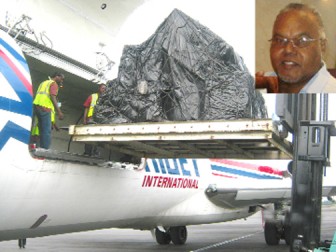Ulric Ceres is upbeat about the prospects for the growth of Guyana’s air cargo service industry. He bases his assessment of the future of the industry on the continued expansion of the Guyana economy, the influx of major investors and the attendant requirement for the movement of goods in and out of the country in order to meet keep the wheels of commerce and industry turning.
Ceres’s company, Total Air Cargo, serves as the local agent for the United States-owned air cargo service Amerijet. Since 2002, the Amerijet/Total Air Cargo partnership has played an important role in what Ceres prefers to describe as “the southbound and northbound” movement of cargo.

Ceres’s establishment of Total Air Cargo was preceded by various other pursuits over the past 35 years, including a stint of around a decade as an employee of the United Nations in New York from 1975. His involvement with the industry he now serves began with his acceptance in 1983 of an offer to run the operations of Laparkan Trading in New York. In 1984, he agreed to return to Guyana to assume responsibility for the company’s operations here. Four years later he left Laparkan’s employ to invest in the gold-mining industry only to return to the sector in 1995 after Amerijet had secured official permission to operate its cargo service to Guyana.
Total Air Cargo’s relationship with Amerijet embraces every aspect of the US Company’s operations in Guyana – from the ground-handling operations associated with the movement of cargo in and out of Guyana to the security of the company’s aircraft once they remain in the local jurisdiction. The responsibilities associated with serving as the local agent for Amerijet saddles Ceres’s company with a range of responsibilities that embrace cargo handling, warehousing and providing specialist security for aircraft.
For customers who prefer to receive their cargo at Timehri, the company operates a warehouse facility at the airport. Most of the cargo, however, is moved by road to the company’s Georgetown warehouse where Ceres’s wife Cicely is in charge of the administrative arrangements associated with the distribution of cargo.
Total Air Cargo has grown with the increased volume of cargo being airlifted to Guyana by Amerijet, a circumstance which Ceres attributes chiefly to increased private investment, primarily in the country’s extractive industries. The presence in Guyana of companies like CGX, Repsol, which are currently engaged in oil drilling operations and Union, which has already invested more than US$50 million in the manganese industry means that between them, Amerijet and Total must keep open a clear supply line for the movement of spares and equipment. Just recently, the two companies were required to facilitate the delivery of 10,000 pounds of spares to CGX.
Serving the expatriate investors apart, Total Air Cargo’s day-to-day routine focuses of supplying the goods required to keep the wheels of local commerce turning. The volume of commercial imports handled by Amerijet and total continues to grow; 40,000-50,000 lbs of hatching eggs per week, foods, shoes, clothing, pharmaceutical and household and utility items. The service also includes the movement of small packages from Miami to Georgetown.
Then there are the responsibilities associated with the handling and processing of outbound cargo. Ceres says that the work of Total Air Cargo and Amerijet has contributed to the opening up of several new markets in the region and in North America. Seafoods are among the cargo transported to the rest of the region.
Ceres says that the growth of the industry has been attended by weightier responsibilities not least of which are those relating to security. Enhanced global attention to security considerations associated primarily with terrorism and the trafficking in drugs has meant the air cargo services must infuse detection and preventive mechanisms and into their operations. Ceres insists that while the movement of cargo is the business of his company it cannot be separated from the need to protect the integrity of the service. Accordingly, his staff of around 20 employees includes trained security specialists whose responsibilities range from ensuring the safety of aircraft on the ground to ensuring the integrity of cargo. Apart from his own cargo inspection regime, outgoing consignments are subjected to three further layers of security checks provided by Customs, CANU and eventually by sniffer dogs assigned to the airport. “These days security is even more serious business. We are required as a matter of course to do a complete search of one in ten packages and when I say search sometimes it literally comes down to what one might call rummaging,” Ceres says.
While Total Air Cargo remains alert to the growth in the illegal trafficking in drugs, Ceres says that his relationship with Amerijet requires the company to pay particular attention to the likelihood that cargo can be used as cover for the shipment of explosives. “9/11 has done a great deal to change the US perspective on likely terrorist threats and our security focus on explosives needs to reflect that reality,” he adds.
Ceres says that the Total/Amerijet team provides customers wishing to utilize its outbound cargo services with transport conveniences that embrace air, sea and land and which facilitates the seamless movement of goods from Guyana to the US and to various destinations within the US. “If, for example, you need to get a package sent to the United States for another destination within the country we can facilitate its movement by road if necessary,” Ceres says.








